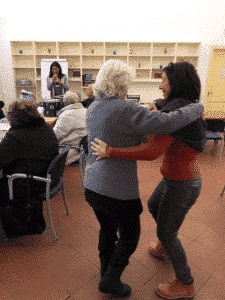4. How to communicate with people with dementia. Some tips.
Whereas there may be general principles of communication in dementia care, particular conversation practices and strategies should be highly individualized. Communicative competence is made of several sub-competences (recall discussion above) which can be compromised in different ways. This makes people with dementia able to draw on a variety of abilities to participate in conversation, even if some other abilities are severely compromised. Accordingly, the first step to be taken before developing a strategy of communication within a care relation is to believe that communication is still possible even when some abilities are compromised.
 Here are some tips which might be useful to develop person – centered (Kitwood 1997) strategies of communication:
Here are some tips which might be useful to develop person – centered (Kitwood 1997) strategies of communication:
Gain attention. As people with dementia usually have difficulties in performing two activities simultaneously, it is very important that the person can devote himself exclusively to the act of communicating without having to perform other tasks including routine tasks such as eating, washing or dressing. This also applies to the interlocutor. If he carries out other activities while talking to the patient or listening, he will surely end up distracting the person with dementia. Make sure you have the person’s attention before speaking. Get close enough so that the person can see your facial expressions and any gestures you may use. Making eye contact helps focus attention and try to keep at little distance (this is also to facilitate the reading of the lips and the identification of facial expressions). As some people have problems recognizing family and friends, you might want to introduce yourself and remind them who you are. Ensure the person is comfortable (not in pain, tired, hungry, too hot or cold, wanting to go to the toilet) before attempting an important conversation.
Limit distractions. Choose a quiet and well-lit environment to speak and signal your arrival through another sensory channel (e.g., saying your name, talking, making noise, touching your hands or shoulders). Reduce distractions like TV, radio, or other people talking in the background and choose places free of other noises in order to avoid confusion, anxiety or irritation for the person, thus facilitating concentration.
Be aware of your tone and body language. When communicating with a person with dementia, how you say something is often more important than what you say. Make sure your body position is relaxed and that your facial expression and stance are coherent with what your words are saying. Speak in a relaxed tone of voice. Make sure you are calm; otherwise the person will notice your anxiety and become anxious themselves. Try to avoid sudden movement which might make the person nervous.
Speak clearly and slowly. Speak slowly and clearly, using short sentences. Avoid metaphoric phrases that can be interpreted literally. Short sentences, visual cues or pictures may help the person with dementia understand what he or she is hearing.
Use gesture or body movements such as pointing or demonstrating an action to help the person understand what you are saying. Of course, this should be done tactfully so the person does not feel you are treating them as a child.
Be patient. Avoid interrupting people with dementia; they may lose their train of thought. Allow them to interrupt you, or they may forget what they want to say. The person may need more time to process the information and respond a question, so be patient and provide reassurance. If they are having trouble communicating, tell them that it’s fine and encourage them to keep trying to put their thoughts into words. If they sense you are impatient or agitated, they may feel stressed or frustrated.
Be respectful. Use the person’s name when addressing her to help her retain a sense of identity. Avoid using childish or “elder” talk or any demeaning language. Do not talk about the person as if she isn’t present. They may still understand what is being said even though they have lost the ability to form the words that are in their mind. Respect the moments where the person doesn’t want to speak.
Try to be reassuring and encouraging. Instead of criticizing and correcting, ignore failures and remember to be supportive, positive and encouraging. If appropriate, explain in understandable terms what is happening and offer reassurance such as, “I’m going to wash your arm now. You’re doing great!”
Suggesting lost words may help and some people appreciate the assistance. For others, however, it is frustrating if you finish sentences for them and get it wrong. Don’t be personally offended if the person who has dementia becomes paranoid or accusatory. Ignore offensive language and try to redirect attention if the person with dementia begins using bad language.
Although, with the progression of the disease, a person’s perception of reality can become confused, it is important to remember that this IS his or her reality. Accordingly, you should avoid contradicting the person you are caring for or shouldn’t try to convince her that her perception of reality is not correct. This will cause just frustration. Research shows that breakdown in the conversation does not just disrupt meaning but also threatens to expose a lack of competence on the part of the person with dementia which has the broader effect of placing the individual’s sense of dignity or positive self-image at stake (Goffman 1967; Hamilton 1994).
Listen carefully. Listen carefully to what the person is saying and observe both verbal and non-verbal communication. Some research showed that an attentive role of the listener – which includes the use of words signaling attention (‘mmm’, ‘yeah’) or news‐marks (‘you don’t say!’) plays a beneficial effect on the communicative competence of the person with dementia (Hydén et al. 2012). If you find it difficult to understand the person, call upon their past experience and what you know about them. If you don’t understand what is said, avoid making assumptions. Check back with them to see if you have understood what they mean. Watch for behavior changes, body language and non-verbal signs that may be used to express a feeling or indicate physical discomfort, in which case you may wish to contact the person’s family doctor.
Focus on the person’s abilities and skills. Although dementia affects certain abilities, the person’s emotions and feelings will remain. Focusing on the person’s abilities and skills will go a long way in adding to their quality of life and will help the person maintain a sense of self. You might want to help the person with dementia to find alternate ways of expression through art, music or other activities to maintain and enhance communication.


Remember that people with dementia tend to reverts back to their native tongue, losing the other languages they might have learnt. Hence it would be useful to learn some key phrases in the person’s original language.
Consider possible hearing or vision problems. Hearing loss is very common in older adults and is often undiagnosed. Try to determine if the person with dementia or the family caregiver has difficulty hearing or seeing. Do they require a hearing aid or eyeglasses? Are those items being used and are they effective? Make sure that the person is wearing a working hearing aid and/or clean glasses, if prescribed. Schedule regular checkups and listen for cues to health problems.
Consider alternative modalities of communication. Even when the person can no longer communicate verbally or recognize you, she likely will still be able to communicate in other ways and feel your affection and reassurance. Especially in later stages, people experience the world primarily through their senses, so stimulate them to maintain a connection. Reading to the person can be comforting, even if they may not understand the words. Also remember that music is a universal language that promotes wellbeing for most of us. Singing or playing together might be a good strategy to establish or maintain a connection.

